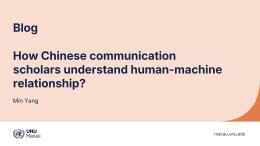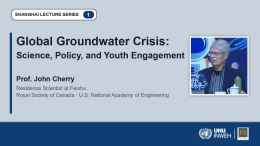On 7 September 2021, UNU-IAS organised the tenth workshop of the SDG–Universities Platform (SDG-UP) through videoconferencing. With 58 participants from 24 universities across Japan, it shared and discussed sustainability initiatives implemented by Arizona State University (ASU), USA. The university has been very active in SDGs-related initiatives, and was ranked first in the USA and ninth in the world in the Impact Rankings by Times Higher Education, released in April 2021.
Dave D. White (Vice President, Global Institute of Sustainability and Innovation, ASU) delivered a lecture on the sustainability vision, initiatives, partnerships, and management of ASU. At ASU, the University Sustainability Practice, an internal consulting service, provides strategic support for sustainability. A task force has been established for the Times Higher Education Impact Ranking, to review the scores each year and identify the best evidence to support contributions to each goal. The SDG & Beyond Task Force works annually to improve the goals of the SDGs, and contributes to strengthening collaboration between the university, governments, businesses, and NGOs. ASU is also working with Starbucks to develop and test strategies for sustainably reinventing the design, build, and operation of its stores and expanding into stores and communities around the world.
Prof. White touched on the university's function as a forum for generating and communicating knowledge about sustainability at the university and for collaborating with stakeholders to resolve issues, emphasising the importance of global networking. He also affirmed ASU’s support for the SDG-UP's inter-university network.
A lively discussion on ASU’s initiatives was moderated by Kensuke Fukushi (Academic Director, UNU-IAS). It was noted that ASU was one of the first universities to develop a cross-disciplinary, integrated approach to sustainability education programmes and training for all students, which had been very effective. The importance of committed leadership was also underlined.
A group discussion was held among the participating universities. On the theme sustainable campuses, it was noted that the various initiatives of each university were often vertically divided, making it difficult to implement uniform initiatives across the entire university. The importance of incentives for such efforts was also pointed out. Examples were also shared of university collaboration with companies and municipalities and issues in the systematic approach of universities. The need for collaboration was stressed, taking into account the characteristics of each university, such as its location (urban or rural/suburban), and status (national or private).
Concluding the meeting, Shunichi Murata (SDG-UP Advisor; Professor, School of Policy Studies, Kwansei Gakuin University) stated that the establishment of a new cross-disciplinary organisation such as ASU's Global Future Laboratory could be effective in solving a wide range of issues related to the SDGs. He also highlighted the need to enhance online education on the SDGs in Japan. He emphasised that the concept of the SDGs contained urgent messages from developing countries — we need to break away from the bias of industrial countries towards consumption and the economy, and the reliance on technology to solve problems. Prof. Murata cautioned that the academic world should be aware of "SDGs-washing" — companies that make superficial efforts to engage with the SDGs without making any significant contribution. He stressed the need to promote behavioral transfer through an international curriculum that emphasises diversity in order to develop students who will be active on the international stage.
A detailed report of this workshop is also available in Japanese.
Participating Universities
24 universities participated in this workshop: (alphabetical order)
Ehime University
Hiroshima University
Hokkaido University
International Christian University
International University of Japan
Kanagawa University
Kanazawa University
Kwanseigakuin University
Keio Gijuku University
Kitakyushu City University
Kyushu University
Nara University of Education
Notre Dame Seishin University
Ochanomizu University
Osaka University
Osaka Medical and Pharmaceutical University
Ryukoku University
Soka University
Tokai University
Tokyo City University
Tokyo Institute of Technology
Tokyo University of Foreign Studies
Toyo University
University of Tokyo


